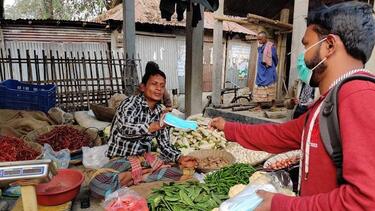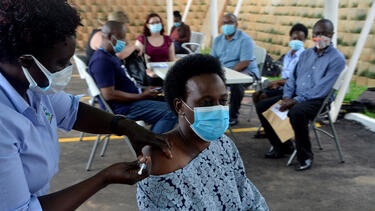Research
Women Aren’t Promoted Because Managers Underestimate Their Potential
Why are fewer women promoted to senior positions than men? In a study of a retail chain, Prof. Kelly Shue and her co-authors found that women got higher performance ratings than men but were incorrectly judged as having less leadership potential.

In a First, Randomized Study Shows That Masks Reduce COVID-19 Infections
A large study co-authored by Yale SOM’s Jason Abaluck and Mushfiq Mobarak found that a mask-promotion program in Bangladesh significantly lowered symptomatic infections, especially among older people and when surgical masks are used.

How to Distribute Scarce Medical Supplies in a Pandemic—and Do It Fairly
Early in the pandemic, states waited in frustration for medical equipment from the Strategic National Stockpile. New research outlines a better way to efficiently and equitably allot emergency supplies.

A Man and a Woman Walk into a Bar: How Gender Changes the Perception of a Bad Joke
Yale SOM’s Taly Reich has found one situation in which women, rather than men, are more likely to get the benefit of the doubt: when they tell jokes that fall flat.

Blockchain Technology Can Help Consumers Tip Farmers—But Should It?
Apps that track food supply chains could make it easier for customers to tip the farmer who produced their coffee or cocoa. But a new paper suggests that this well-intended feature might reduce farmers’ overall income.

Building Bridges Can Boost Income for the Rural Poor
Yale SOM’s Kevin Donovan and Wyatt Brooks of Arizona State University found that building footbridges in rural communities allows residents to access work in nearby towns, with benefits for themselves and their neighbors.

Black and Latinx Conservatives ‘Upshift’ Competence to White Audiences
A new study by Yale SOM’s Cydney Dupree finds that when politically conservative Black and Latinx Americans speak in mostly White settings, they are more likely than their liberal counterparts to adopt language associated with power, status, and ability.

To Stop a Pandemic in Its Tracks, Coordinate across Borders
New research co-authored by Yale SOM’s Paul Goldsmith-Pinkham shows that a proactive approach, in which jurisdictions respond to infections in neighboring areas, can dramatically lower spread in the early stages of an epidemic.

Send Vaccines Where People Want Them: Developing Nations
COVID-19 vaccine acceptance is significantly higher in low- and middle-income countries than wealthy ones. Prioritizing those countries for vaccine distribution could help save more lives and keep variants at bay.

Could Be Worse: When You See Others Losing More, You’re More Likely to Take Risks
What induces people to take greater risks in certain situations—such as sitting at the blackjack table in a glitzy casino? A new study from Yale SOM’s Nathan Novemsky and Guy Voiche reveals that we experience losses as less painful when we see examples of bigger losses.
